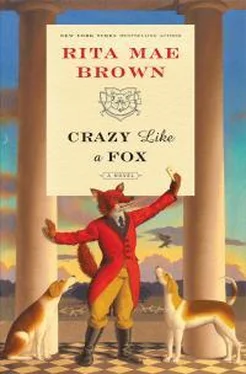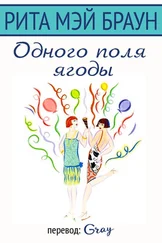A really long pause followed this, then Crawford assented. “You’re right.”
“I am drawing a red square around this day in my desk calendar.” Larry laughed, as Crawford laughed with him. “It’s good to hear your voice. I can tell you what our analysis is up here.” He paused. “It’s going to get a lot worse before it gets better.”
“Yes, I think so, too.”
“Can you develop new markets? I’m assuming the losses are with the mat company, Protect All.”
“Are. Larry, it takes years, sometimes, to develop new markets. I’d always hoped Africa would build good roads. I’d love to expand there but even South Africa—hell, the elephants can’t walk on those damn roads once you get out of the cities.”
Larry laughed. “True, but I do love Cape Town. Melanie and I go once a year to visit Danielle, Nate, and the kids. I was worried when she chose to move there. Well, I was worried when she fell in love, but God, it is beautiful and seems stable enough.”
“I don’t know if any place is stable anymore. Truly. I’m even wondering about us.”
“You’re in a doom-and-gloom mood. We do this every eight years. We’ll survive. You know history. You love history.”
Crawford smiled. “You’re right. Hell, we survived Buchanan.”
“I know you’ve moved some investments out of Europe. You’re fine. If Protect All’s profits drop, even if they drop precipitously, hang on to the company. It’s a damn good one, Crawford. You were shrewd as always to buy it. Gotta go, bro.”
Crawford hung up the phone somewhat mollified, but the numbers were jarring. He returned to his enormous computer screen, built just for him at a cost of twelve thousand dollars. He loved it despite what he saw at this moment.
Marty popped her head into his office. “Sweetie, coffee? Tea? Coke?”
“No. Just got off the phone with Larry. Sounds great.” He wrinkled his brow. “Wanted to talk to him about the strong dollar and”—he exhaled—“the faltering Euro. He thinks it will get worse.”
“Let’s take a ride. It’s a perfect September day. That will restore your spirits. I’ll call Sam and have him saddle up our babies.”
He nodded. “You’re right. Nothing I can do here anyway.”
“Is everything else all right?”
“Yes, it is. I just sometimes think the world is going to hell.”
“Honey, people have been saying that since B.C.” She laughed.
Once at the stable, Sam brought out two immaculately groomed horses. “I didn’t tell Skiff you were going out. She’s out there roading the hounds.”
“Ah, good.” Crawford smiled.
Sam Lorillard, a reformed alcoholic, now in his mid-sixties, was an early recipient of a scholarship to Harvard, no mean feat for an African American of his generation. He blew it. His brother Gray saved him, literally pulling him off the streets down at the old C&O train station, throwing his sorry ass into rehab.
Crawford was the only person who would hire Sam, since most everyone in central Virginia had been disappointed, let down, or, if female, dumped by him, or the reverse.
Gray, now retired as a partner from a prestigious accounting firm in D.C., was Sister’s gentleman friend. No one of their generation would say “lover.” And as Crawford set himself against The Jefferson Hunt and Sister, it could get dicey. Sam loved Sister. He’d hunted with her since college, but he had to eat and he needed the self-respect of a job.
“How’d Ranger do yesterday?” Crawford inquired of the young horse Sam hunted with Sister.
Crawford liked his horses trained. They couldn’t really do it with his hounds. He was more than happy to use Jefferson Hunt for this.
“A little fussy at the checks but he’s getting it.” Sam held the offside stirrup, the right one, while Marty mounted, then performed the same service for Crawford.
Looking up at his boss, Sam said, “You know everything about technology.”
“I wouldn’t go that far.” Crawford liked the compliment.
“My brother told me about a strange incident at the Museum of Hounds and Hunting.” He proceeded to relate the story with detail, as Gray had seen the video.
“It’s possible to do something like that with a hologram. We will soon see modern films with late, great actors in them, bit parts perhaps but quite believable. It would be possible to do this if there was original footage of—what’s his name?”
“Weevil. A nickname, as he was called, behind his back, ‘The Necessary Evil.’ ”
Marty laughed. “Must have been quite a character.”
“So they say.”
Crawford reconsidered the story. “Yes, it could be done with a hologram.” He paused, glanced down at Sam. “But no hologram could have stolen the horn. Has to be some kind of prank.”
Some prank.
CHAPTER 4
The kennel office, a fifteen-by-twenty-foot room, enjoyed light from old paned-glass sash windows. The floor was granary oak from a torn-down grain storage building. The office was part of the original design in 1887. M. A. Venable, the founding Master of The Jefferson Hunt, shrewdly used whatever he could find that was inexpensive. Today those granary oak floors would be dubbed “repurposed” and cost a bloody fortune.
Sister kept the windows cleaned and shined, too. When she walked to her desk the floor, still tight as a tick, didn’t creak. She did.
An attractive fireplace centered in the wall opposite the front door was simple; the surround was wood, and under the mantel a wonderful carved foxhunting scene unfolded. This had been done by a Czech, one of those early immigrants at the end of the nineteenth century who had superior woodworking skills.
Sister’s desk sat opposite Shaker’s, a rough sort of partner’s desk arrangement, as the desks came from old schools when schools became consolidated in the late 1950s and early 1960s. The original desk used by Mr. Venable had been a Louis XVI, black with gold ormolu. Somewhere along the way it disappeared. Sister hoped the day would come when she’d walk into a room and there it would be.
Jefferson Hunt had fallen on hard times after World War I. Venable was dead by then. The place sat vacant until five years later, in 1925, Virgil Arnold, Sister’s uncle-in-law, a confirmed bachelor as the phrase went, bought it. When he died he willed it all to Ray. Ray and Sister were young then, with the energy to transform the place.
The hunt limped along over the early years without Venable. Hounds were kept in the majestic brick kennels, each wing connected by a brick archway: girls to the left, boys to the right.
Despite her protests, Sister was elected Master in 1973, possibly because she modernized the kennels with electricity, etc., even before she and Ray focused on the house. Her love of hounds did not go unnoticed.
Everything in the kennels could be easily washed down, whether it was the feed room or the two large squares where the hounds slept on raised berths. Skylights allowed light in those rooms, which saved on the electric bill. On the bitterest days, the boys and girls had heat thanks to the wall heaters beside the metal inside doors. The solid outside door, also covered in tin, had a square opening to the outside, covered by a rubber flap. The hounds could go in and out without wasting heat.
In summer’s heat hounds preferred being outside in their huge runs, huge as in an acre each. The doors would be open for breezes. They had sections of raised boardwalks so they could sleep off the ground if they liked that. They also had what Sister now called condos, special buildings with wraparound decks. In summer one entire side of the condos was removed. They could go in for shade but enjoy air circulation. In winter the side was closed with an opening.
Читать дальше












